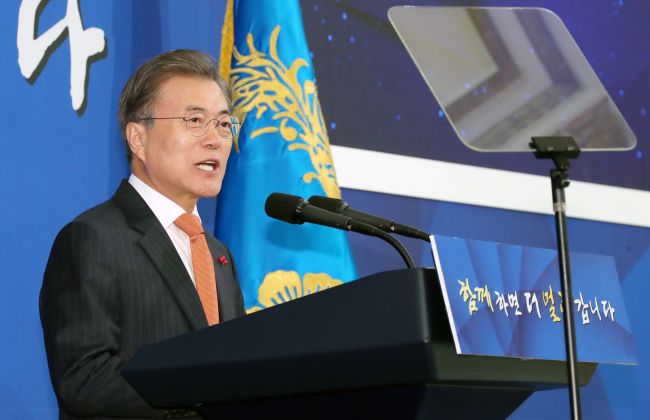Moon decries 2015 Korea-Japan ‘comfort women’ deal as flawed
By Jung Min-kyungPublished : Dec. 28, 2017 - 18:17
President Moon Jae-in said Thursday that the 2015 South Korea-Japan agreement on Japan’s wartime enslavement of Korean women does not resolve the “comfort women” issue. He also stressed it was a “political agreement” that did not take the opinions of victims and citizens into account and urged the government to swiftly take follow-up measures.

The accord pushes for both nations to “finally and irreversibly” resolve the comfort women issue, and Tokyo made financial compensation of 1 billion yen ($9 million) to the victims through a fund. “Comfort women” is a euphemism for women, mostly Koreans, who were forced into sexual slavery during World War II.
“It has been confirmed that the negotiations on the comfort women issue between South Korea and Japan in 2015 had significant defects in terms of procedures and content. It is regrettable but something that we can’t evade,” Moon said in a statement.
“This runs afoul of the established universal principle of the international community for settling history issues, and above all, it was a political agreement that excludes victims themselves and citizens,” he added.
“Along with the citizens, I, as president, make it clear again that the comfort women issue can’t be settled through the deal.”
Moon also said Korea would continue pursuing a two-track approach of separating diplomatic matters from historical issues in Korea-Japan relations.
“Separately from the settlement of the historical issue, I will try, at the same time, to restore normal diplomatic relations for future-oriented cooperation between Korea and Japan,” he added.
Moon’s announcement came a day after a Foreign Ministry task force announced the outcome of a monthslong investigation into the controversial deal. The task force’s report revealed that the previous Park Geun-hye administration kept parts of the bilateral deal secret from the public to avoid backlash and failed to communicate properly with the victims before reaching the agreement.
Moon, upon taking office in May, vowed to revisit the deal saying that South Korean citizens are unable to “emotionally accept” the agreement.
Cheong Wa Dae remained cautious, saying that the government has yet to decide its position on the deal.
“The government will determine its position after sufficiently listening to opinions and views of former comfort women and other organizations (supporting them),” a Blue House official told reporters, requesting anonymity.
In line with the task force’s report, South Korean Foreign Minister Kang Kyung-wha told a group of reporters Thursday that Seoul would start meetings with the victims and relevant civic groups. Kang previously said that the government would take a “victim-oriented approach” in reviewing the bilateral deal.
Following the announcement by the task force, Japanese Foreign Minister Taro Kono said in an official statement Wednesday that it would be “unacceptable” for Seoul to make any attempts to revise the agreement, and such a move would make Japan’s relations with South Korea “unmanageable.” Japan has been asking Korea to “faithfully” carry out the accord.
Japanese Prime Minister Shinzo Abe did not release a direct statement, but Japan’s Nihon Keizai Shinbun reported that he said Japan would not move even “one millimeter” regarding the agreement.
Meanwhile, experts here are expressing concerns about Korea-Japan ties amid North Korea’s ongoing nuclear weapons development and provocations.
“South Korea’s relationship with Japan is likely to face a rocky road from now on,” said Jin Chang-Soo, director of the Sejong Institute.
“The South Korean government must maintain stable communication with Japan in order for the comfort women issue to not negatively affect bilateral ties,” he added.
“The South Korea-Japan bilateral relations (is expected to face a rocky road) in 2018, not just over the comfort women issue, but also with court rulings on victims of forced labor during World War II, the regular territorial claim over the islets of Dokdo, along with issues surrounding textbooks,” Lee Myon-woo, a senior research fellow at the Sejong Institute, said in the think tank’s 2018 forecast.
“Resolving the comfort women issue is important as advancement in North Korea’s nuclear and missile program calls for improvement in South Korea-Japan ties.”
By Jung Min-kyung (mkjung@heraldcorp.com)



















![[Today’s K-pop] Treasure to publish magazine for debut anniversary](http://res.heraldm.com/phpwas/restmb_idxmake.php?idx=642&simg=/content/image/2024/07/26/20240726050551_0.jpg&u=)